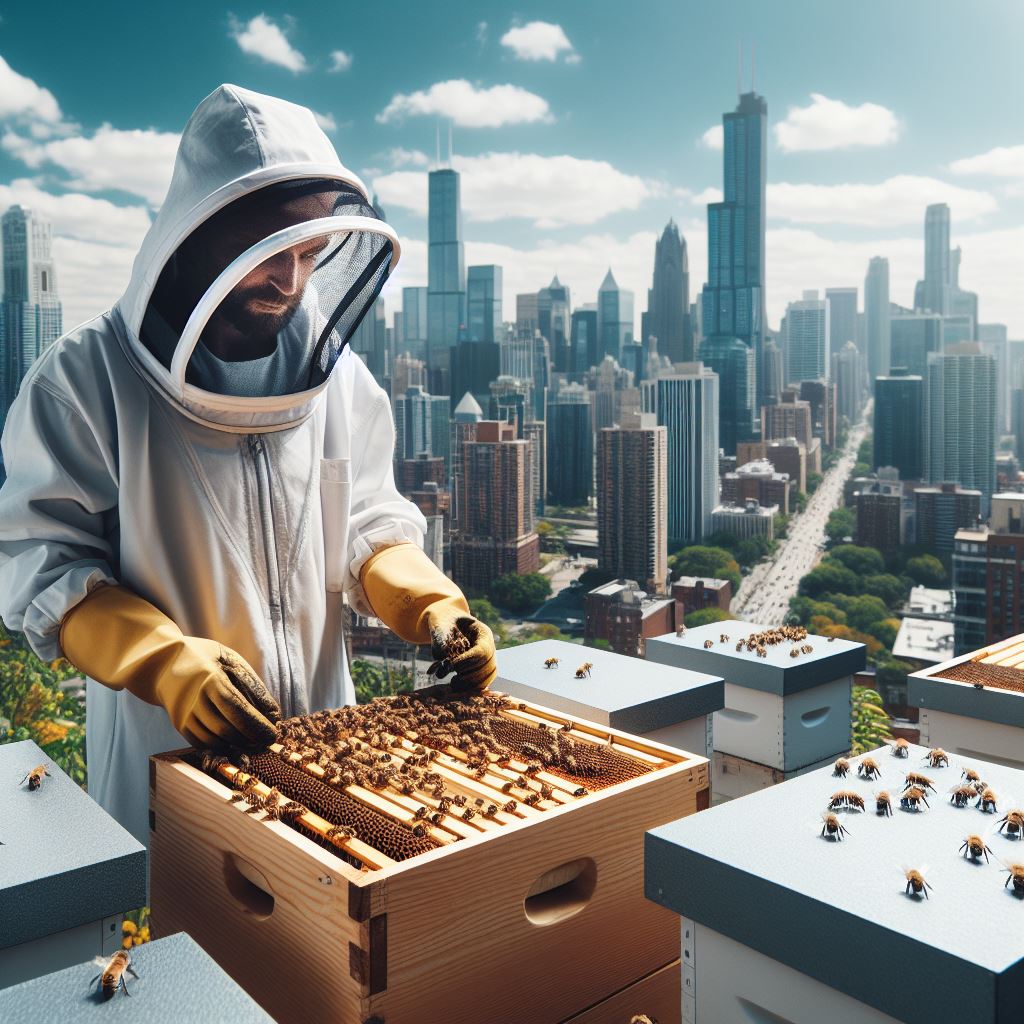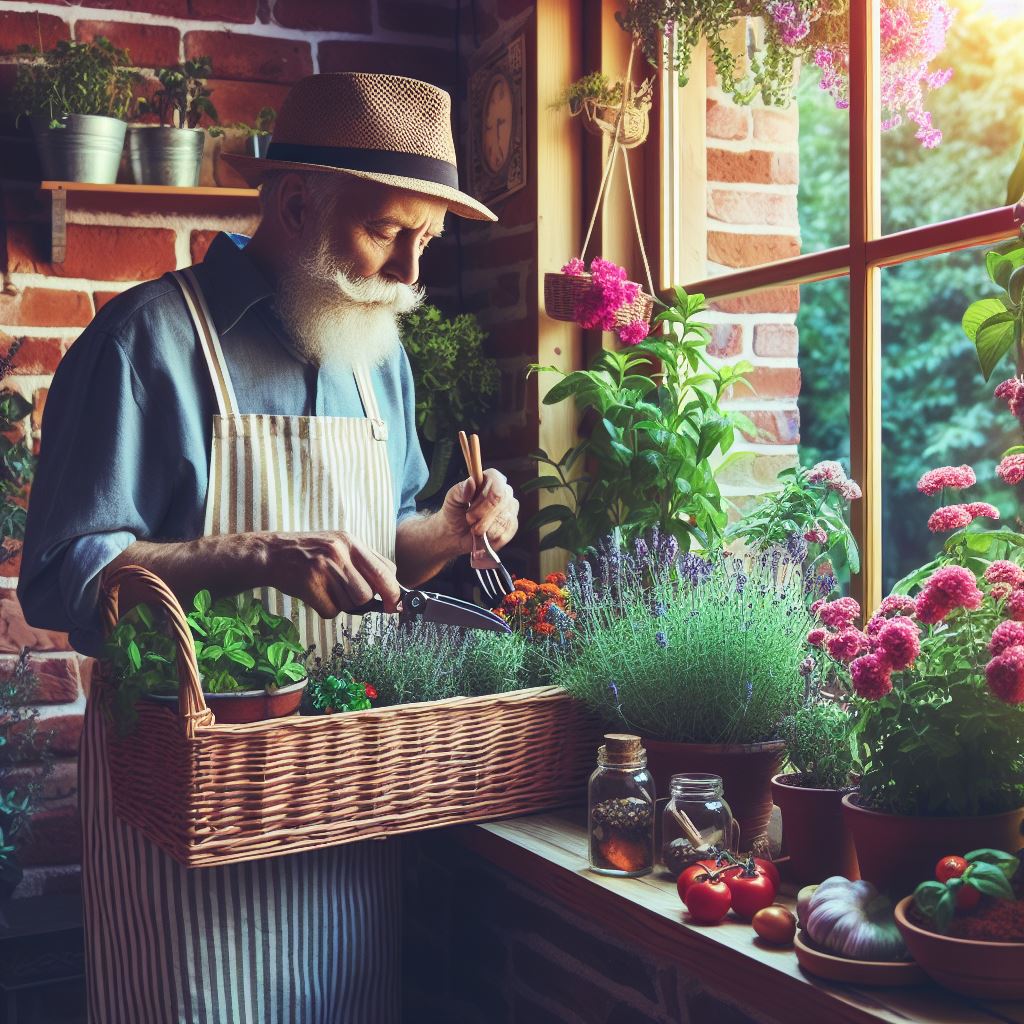Introduction
Urban Beekeeping City Pollinators are essential contributors in urban environments, fostering the growth of gardens, orchards, and wild plants by playing a crucial role as pollinators.
With increasing awareness of declining bee populations, urban beekeeping has risen in popularity across cities worldwide.
Having beehives in community gardens, on rooftops, and in backyards allows urbanites to directly support pollinators and cultivate an ecologically sustainable city habitat.
Backyard beekeepers find tending hives incredibly rewarding.
Observing bees up close builds an appreciation for their complex social structures and industriousness.
Harvesting fresh, hyper-local honey is a delicious benefit. With proper setup and care, urban beekeeping can be practiced safely even in dense neighborhoods.
Classes help beginners learn techniques for maintaining hives while minimizing risks.
Many cities now offer resources to guide and encourage responsible urban apiculture.
Welcoming bees assists biodiversity and food security in our own communities.
As more urban dwellers rediscover the joy and benefits of beekeeping, cities can become havens where bees and humans thrive together.
The Role of Pollinators in the City
Benefits of Pollinators in Urban Landscapes
- Increased food production: Pollinators play a crucial role in pollinating crops, leading to higher yields.
- Enhanced biodiversity: By facilitating plant reproduction, pollinators support a diverse range of plant species in urban areas.
- Improved urban aesthetics: The presence of pollinators adds beauty and vitality to urban landscapes through vibrant flowers and plants.
Challenges Faced by Pollinators in Urban Areas
- Habitat loss and fragmentation: Urbanization often results in the destruction of natural habitats, making it difficult for pollinators to find suitable places to nest and forage.
- Pesticide exposure: The use of pesticides in urban environments poses a significant threat to pollinators, as they can consume contaminated nectar and pollen.
- Climate change impact: Rising temperatures and changing weather patterns affect the timing and availability of flowers, affecting the life cycles of pollinators.
Pollinators are essential for urban ecosystems, contributing to the overall health and sustainability of cities.
Here, we explore the benefits they provide and the challenges they face in urban landscapes.
Benefits of Pollinators in Urban Landscapes
Pollinators, such as bees, butterflies, and birds, are crucial for the process of pollination.
This process allows plants to reproduce by transferring pollen from the male reproductive organs to the female reproductive organs. The following are the key benefits of pollinators in urban areas:
- Increased food production: Pollinators are responsible for pollinating many fruits, vegetables, and nuts, which are important food sources for both humans and wildlife. Their activities contribute to higher crop yields and ensure a more abundant food supply.
- Enhanced biodiversity: Pollinators play a fundamental role in maintaining a diverse range of plant species. By facilitating the reproduction of plants, they help sustain the ecosystem, supporting a wide variety of species in urban environments.
- Improved urban aesthetics: The presence of pollinators brings life and color to urban landscapes. The vibrant flowers and plants they pollinate create visually appealing spaces, enhancing the overall beauty of cities.
Challenges Faced by Pollinators in Urban Areas
Despite their importance, pollinators face numerous challenges in urban environments, which can significantly impact their populations.
Transform Your Agribusiness
Unlock your farm's potential with expert advice tailored to your needs. Get actionable steps that drive real results.
Get StartedThe following are the main challenges they encounter:
- Habitat loss and fragmentation: Urbanization leads to the destruction and fragmentation of natural habitats, leaving pollinators with limited places to nest, feed, and reproduce. The loss of green spaces and the conversion of land for infrastructure development further exacerbate this issue.
- Pesticide exposure: The use of pesticides in urban areas poses a considerable risk to pollinators. When they consume nectar and pollen from flowers treated with pesticides, it can harm their health and even lead to death.
- Climate change impact: Urban areas experience the effects of climate change, including rising temperatures and altered weather patterns. These changes affect the availability and timing of flowering plants, disrupting the synchronized relationship between pollinators and their food sources.
Essentially, pollinators play a crucial role in urban ecosystems, providing various benefits such as increased food production, enhanced biodiversity, and improved urban aesthetics.
However, they face significant challenges in urban areas, including habitat loss, pesticide exposure, and climate change impact.
It is essential to prioritize their conservation and create sustainable urban environments that support their well-being.
Read: Tiny Orchard: Fruit Trees in Pots
Urban Beekeeping: An Overview
Definition and purpose of urban beekeeping
Urban beekeeping refers to the practice of keeping honeybees in urban areas, such as cities and towns.
The purpose of urban beekeeping is to promote bee conservation, increase pollination rates, and produce local honey.
Historical background of urban beekeeping
Urban beekeeping dates back centuries, with evidence of honeybees being kept in cities as far back as ancient Egypt.
However, it recently gained popularity as people became more aware of the importance of bees in urban environments.
Types of urban beekeeping setups
Rooftop beekeeping
Rooftop beekeeping is a common type of urban beekeeping, where beehives are installed on the rooftops of buildings.
This setup maximizes space utilization and provides bees with access to a variety of flowering plants.
Backyard beekeeping
Backyard beekeeping involves keeping beehives in the backyard of a private residence.
It is suitable for individuals who have enough outdoor space and are interested in producing honey for personal consumption.
Community-based beekeeping
Community-based beekeeping typically involves multiple individuals or families coming together to establish beehives in community gardens or public spaces.
It promotes a sense of shared responsibility and benefits the entire community.
Urban beekeeping offers multiple benefits, such as increased pollination rates and the production of local honey.
It also provides urban dwellers an opportunity to connect with nature, learn about beekeeping, and contribute to bee conservation efforts.
Whether it’s rooftop, backyard, or community-based setups, urban beekeeping plays a vital role in creating sustainable urban ecosystems.
Read: Indoor Edibles: Grow Food Inside
Benefits of Urban Beekeeping
Urban beekeeping offers numerous benefits, making it an increasingly popular practice in cities around the world.
From increased honey production to educational opportunities, here are some key advantages of keeping bees in urban environments:
Increased honey production
Urban beekeeping can significantly boost honey production as bees in cities have access to a diverse range of nectar sources.
The abundance of flowers, gardens, and parks in urban areas provides an ample food supply for bees, resulting in higher honey yields.
Garden productivity and diversity
Bees play a crucial role in pollinating plants, including those in urban gardens.
Showcase Your Farming Business
Publish your professional farming services profile on our blog for a one-time fee of $200 and reach a dedicated audience of farmers and agribusiness owners.
Publish Your ProfileBy keeping bees, urban beekeepers can enhance the productivity and diversity of their own gardens as well as those in their communities.
With bees actively pollinating flowers, fruits, and vegetables, gardeners can enjoy bountiful harvests and vibrant plant growth.
Educational opportunities
Urban beekeeping offers valuable educational opportunities for individuals of all ages.
By becoming urban beekeepers, people can learn about the intricate lives of bees and their essential role in the ecosystem.
Beekeeping workshops, classes, and educational events help raise awareness about the importance of pollinators and foster a deeper appreciation for nature.
Local honey and health benefits
One of the rewards of urban beekeeping is the opportunity to enjoy fresh, local honey.
Urban beekeepers can harvest their own honey, free from additives and preservatives, resulting in a superior and more flavorful product compared to store-bought honey.
Local honey also has potential health benefits, as it may help alleviate seasonal allergies when consumed regularly.
In addition to these specific benefits, urban beekeeping also contributes to the overall well-being of the environment and community.
Additional advantages worth mentioning
Here are some additional advantages worth mentioning:
Conservation of pollinators:
Urban beekeeping helps support and conserve local bee populations, which are facing threats due to habitat loss, pesticides, and disease.
By providing a safe haven for bees in urban areas, beekeepers contribute to the protection of pollinator species.
Environmental sustainability
Bees are vital to the health of ecosystems as they facilitate pollination, a process necessary for the reproduction of many plant species.
By promoting beekeeping, cities can enhance their green spaces and promote a more sustainable environment.
Community engagement
Urban beekeeping brings people together and fosters a sense of community.
It creates opportunities for collaboration and shared interests, leading to stronger neighborhood bonds and a greater sense of environmental responsibility.
Natural pest control
Bees play a role in natural pest control by preying on insects harmful to crops and gardens.
By attracting bees through beekeeping, urban areas can discourage the presence of pests and reduce the need for chemical pesticides.
In general, urban beekeeping offers a multitude of benefits, including increased honey production, enhanced garden productivity, educational opportunities, and access to fresh local honey with potential health benefits.
Moreover, it contributes to the conservation of pollinators, promotes environmental sustainability, strengthens community engagement, and provides natural pest control.
With these advantages in mind, urban beekeeping continues to thrive and positively impact both individuals and cities as a whole.
Read: Patio Farming: Fresh Food, Small Area

Steps to Start Urban Beekeeping
Researching and Understanding Local Regulations
- Begin by conducting thorough research on local regulations regarding urban beekeeping.
- Familiarize yourself with any permits, licenses, or restrictions imposed by your city or municipality.
- Consult local beekeeping associations or government agencies for accurate information.
- Ensure compliance with zoning laws, hive placement restrictions, and specific guidelines for urban beekeeping.
Acquiring Necessary Equipment
- Purchase essential equipment such as beehives, protective clothing, and beekeeping tools.
- Invest in a hive stand, frames, foundation, a bee brush, a smoker, and a hive tool.
- Consider using a top-bar hive or a Langstroth hive, which are suitable for urban beekeeping.
- Obtain high-quality beekeeping supplies from reputable suppliers or local beekeeping stores.
Choosing the Right Honeybee Species
- Research different honeybee species to select the most suitable ones for urban environments.
- Consider docile and gentle strains such as Italian bees or Carniolan bees.
- Ensure the chosen honeybee species can adapt to your local climate and environmental conditions.
- Consult experienced beekeepers or local associations to determine the best option for your area.
Locating Suitable Hive Locations
- Identify appropriate hive locations in your urban setting that meet both bee and human needs.
- Choose areas with access to sunlight, shelter from strong winds, and adequate forage sources.
- Ensure the hive placement does not pose risks to the public or infringe on regulations.
- Consider rooftops, balconies, gardens, or other areas with sufficient space and minimal disturbances.
Creating a Supportive Environment for Pollinators
- Optimize your garden or surrounding area to provide a supportive environment for pollinators.
- Plant a variety of native flowers, herbs, and trees that offer nectar and pollen throughout the year.
- Avoid using pesticides and herbicides that can harm bees and other beneficial insects.
- Ensure a consistent water source is available nearby, for example, a shallow birdbath or small pond.
By following these steps, you can embark on your urban beekeeping journey with confidence.
Remember to continually educate yourself, seek advice from experienced beekeepers, and enjoy the rewarding experience of contributing to pollinator conservation even in the heart of the city.
Read: Vertical Gardens: Maximize Your Space
Explore Further: Drought-Resistant Gardening Strategies
Challenges and Considerations in Urban Beekeeping
Achieving successful urban beekeeping requires addressing several challenges and considerations to ensure the well-being of the bees and the safety of the surrounding community.
Neighbor Cooperation and Safety Concerns
- Engaging neighbors and educating them about the benefits of urban beekeeping is crucial.
- Addressing safety concerns through proper bee-proofing and establishing clear boundaries is essential.
- Regular communication and fostering a cooperative relationship with neighbors can help prevent conflicts.
Bee Diseases and Pest Management
- Urban beekeepers need to be vigilant in identifying and managing diseases that can affect honeybee colonies.
- Implementing integrated pest management strategies can reduce the likelihood of outbreaks and limit the use of chemical treatments.
- Regular inspections and monitoring are necessary to detect and address any signs of infestation or disease in a timely manner.
Seasonal Management Practices
- Beekeepers must adapt their practices to the changing seasons and urban environments.
- Properly managing the hive’s food stores, ensuring adequate ventilation, and protecting the colony from extreme weather conditions are crucial.
- Providing supplementary feeding during lean periods and preparing the hive for winter can help ensure colony survival.
Monitoring and Addressing Colony Health Issues
- Regularly monitoring the health of bee colonies through visual inspections and brood pattern analysis is essential.
- Promptly addressing any signs of stress, disease, or queen issues can prevent colony collapse.
- Seeking advice from experienced beekeepers or local beekeeping associations can provide valuable guidance in handling health issues.
Sustainability and Financial Considerations
- Beekeeping in the city requires careful financial planning to cover the costs of equipment, maintenance, and potential losses.
- Considering the availability of suitable forage in urban areas is essential for sustaining healthy honeybee colonies.
- Pursuing alternative revenue streams such as selling honey, beeswax products, or offering bee-related services can contribute to the sustainability of urban beekeeping.
Addressing these challenges and considerations in urban beekeeping ensures harmonious coexistence between bees, beekeepers, and the urban environment.
By creating a safe and healthy environment for bees, we can support their vital role as pollinators and contribute to the sustainability of our cities.
Urban Beekeeping Success Stories
Examples of successful urban beekeeping projects
- The Seattle Urban Beekeeping Cooperative has successfully maintained beehives in various locations throughout the city.
- The Chicago Honey Co-op has been praised for their innovative approach to urban beekeeping in vacant lots.
- London’s Bermondsey Street Bees has turned unused rooftops into thriving honeybee colonies.
- The Melbourne City Rooftop Honey Project has successfully created urban beekeeping hubs across the city.
Positive impacts on local communities and environments
- Urban beekeeping projects have increased local pollination, resulting in healthier plants and improved crop yields.
- Honey produced by urban bees has provided a sustainable and locally sourced alternative to store-bought honey.
- Beekeeping initiatives have educated communities about the importance of pollinators and their role in the ecosystem.
- Urban beekeeping has also fostered a sense of community and connection among residents, who work together to maintain the beehives.
Lessons learned and best practices
- Adequate space and access to forage are essential for urban beekeeping success.
- Regular hive inspections and maintenance are crucial to prevent pest and disease infestations.
- Proper education and training on beekeeping practices should be provided to ensure the well-being of the bees.
- Collaboration and partnerships with local organizations, businesses, and authorities can provide support and resources for urban beekeeping projects.
- Prioritizing the use of organic and non-toxic methods for pest management is vital to protect the health of both bees and the environment.
- Engaging with the local community through educational events and outreach programs can help build support and awareness for urban beekeeping.
In essence, urban beekeeping has proven to be successful in various cities worldwide, with projects like the Seattle Urban Beekeeping Cooperative, Chicago Honey Co-op, Bermondsey Street Bees, and Melbourne City Rooftop Honey Project showcasing the positive impacts on local communities and environments.
These success stories highlight the importance of lessons learned and best practices, such as providing adequate space and forage, regular hive inspections, proper education, collaboration, and eco-friendly pest management.
Through urban beekeeping, cities can contribute to the preservation and well-being of pollinators while fostering a sense of community and sustainability.
Conclusion
The role of pollinators in urban areas cannot be underestimated.
Bees, butterflies, and other pollinators play a crucial role in maintaining biodiversity and food security within cities.
By engaging in urban beekeeping, individuals can contribute to the conservation and expansion of pollinator populations.
Urban areas provide unique opportunities for beekeeping, with rooftops, balconies, and community gardens serving as potential beekeeping sites.
Supporting and protecting pollinators is essential for maintaining healthy ecosystems in cities.
By planting pollinator-friendly plants, avoiding the use of pesticides, and providing nesting sites for bees, we can create urban environments that are conducive to pollinator survival.
In a nutshell, let us recognize the vital role that pollinators play in our cities and take steps to support and protect them.
Urban beekeeping offers a tangible way for individuals to actively participate in pollinator conservation and enjoy the rewards of harvesting their own honey.
Showcase Your Farming Business
Publish your professional farming services profile on our blog for a one-time fee of $200 and reach a dedicated audience of farmers and agribusiness owners.
Publish Your Profile



